After severe floods devastated Kenya’s Tana Delta in 2024, CWS launched a recovery effort through the Mwanga Project, helping nearly 1,800 people rebuild their livelihoods with tools like livestock, training and agriculture support. Through that support, the Kipini Disability Fellowship emerged as a model of resilience—turning poultry and goat distributions into a sustainable, community-driven path to recovery and empowerment. In …
Stories of Change

image of Margaret Kitheka
“I remember that day, as if it was a dream”
“I remember that day, as if it was a dream… like a drama…” Margaret Kitheka states, as we begin a conversation about her unexpected ascension to the leadership position of her self-help group, where she now sits as the group secretary. The following text is Margaret’s retelling of her experience becoming a leader in this program:
With the CWS project this year, we underwent training on the production of crops on our individual farms and, during one of the follow-up meetings, one of the members proposed that I host the community demonstration plot on my farm. As a middle-aged woman whose husband has been imprisoned for several years and raising her children on my own, I was surprised that the community members would select my farm to host the demonstration. I wasn’t sure at first, but a firm reminder from our Crop Production Facilitator (CPF) of the progress I had made throughout the season made me accept, albeit half-heartedly. This decision changed my life, literally.
As we dug the demonstration farm during our weekly visit with our CPF, I made sure that the CPF would spend a little extra time on my farm, and he helped me scout the common pests and identify the best place to set up terraces. Whenever I visited my neighbor’s farms, I would make the effort to help them to scout their land, encourage them to also dig their Mandala Gardens and to save up the leftovers for the compost heap. Although I wasn’t awarded, my name was mentioned as one of the best performers in our entire group, not once but twice!
One day, CWS staff brought our area officer in charge of all women and self-help groups, Madam Rose. She spoke to us about the importance of strong leadership in making groups succeed. She reminded us that a good leader is one who starts by leading him or herself, by following the instructions of what we have learned and by always helping others with work, so we do not leave anyone behind.
When Madam Rose looked at our records, I realized there was a lot that could be done to make our group strong and to reduce in-fighting. What I realized as she spoke, was that the idea of a leader I had in mind—someone bold, a good speaker, someone who can command people to listen to them, someone well-educated—was very different from what she was saying: someone humble, who is able to complete their work quickly and help others, someone who asks questions and shares information with members swiftly, someone who remembers and reminds others of what they had agreed to do.
The more she spoke, the more I realized that the type of leader she was describing was me! When she asked for volunteers to the executive committee to lead the group, I was not surprised when those who I expected to volunteer to lead, raised their hands for the position of chair and treasurer. But when it came to the secretary position, most of the members who were nominated to do so, chose not to. I don’t recall exactly why I raised my hand. For a few moments, even the other group members did not seem to notice that I had raised it.
Before I could change my mind, Madam Rose asked me to stand up and I was whisked away to a separate part of the house where I could not see what was happening. As I waited, the doubts came back; I am not well educated, I am not wealthy, I do not have a husband…it was too late. When I tried to change my mind by going back to the group proceedings, they asked me firmly to go back until I was called back.
After what felt like an eternity, our teacher Mwikali came to collect me. I tried to read her face, but she was not smiling at all. When I got to the group, Madam Rose announced the new office holders, and I was selected as the secretary by the members. I heard a few of them say I do not see well, but I interjected that I had perfect eyesight. I decided to own up to the fact that I am not very well-read, but our teachers told us that they would train us and help us to adapt to the new position.
As we speak, I have been included as one of the bank signatories for our group account. I have read the minutes in my local language and work with my son to translate anything required in English. My new role did not stop me from working hard on my farm. As I listened to the December list of best performers, my name was called second, meaning that next time, if I work hard and continue to support my neighbors, I shall take up the first place!
I thank CWS for the confidence they have given us, the knowledge to change our individual lives, to change our work as groups and to influence our neighbors so that we can all together fight this climate change.
To learn more about CWS’ work in Kenya, click here. To learn more about how CWS works with communities around the world to adapt to climate change, click here.
Stories of Change
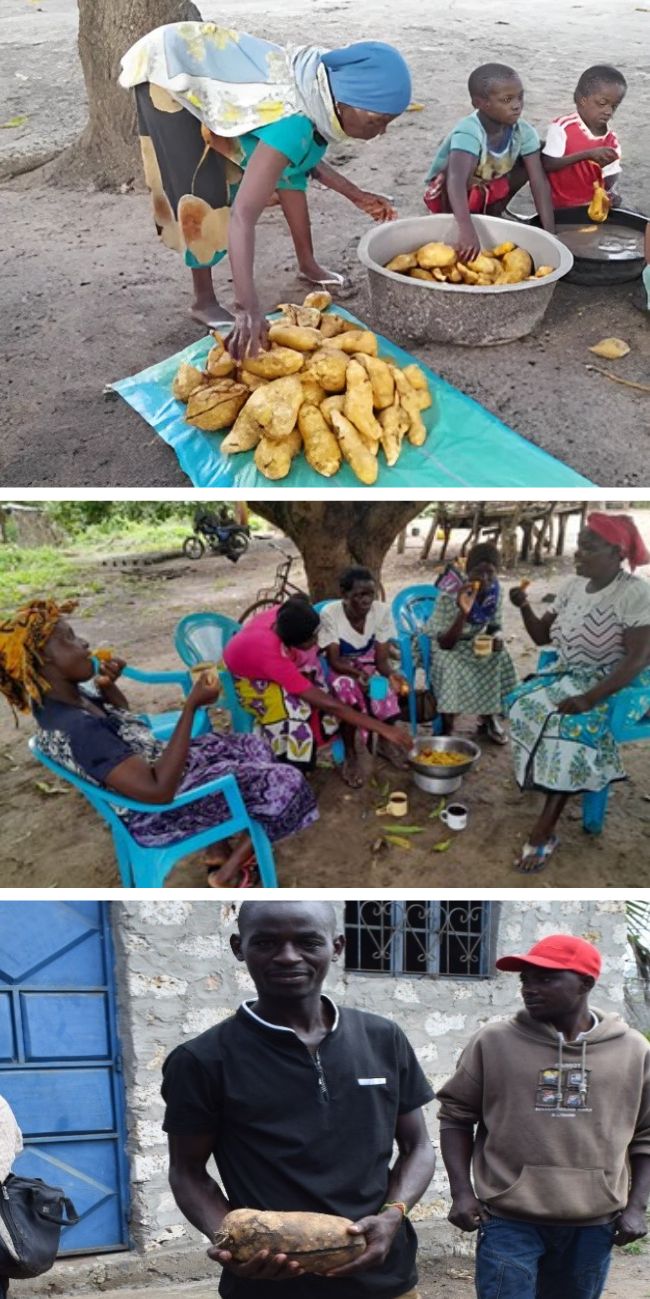
Top: A family preparing sweet potatoes for market ; Middle: Members of the Gatundu self-help group enjoy some sweet potatoes; Bottom: Charles showcases the size of sweet potatoes harvested from his farm
A Sweet Investment Brings Success
If you invest in one potato, can you double that investment? How about triple it? One of CWS’ program participants in Tanzania, Charles Dzombo, has the answer to this question.
Charles is a program participant in CWS’ sweet potato project and was excited to share his story after receiving support from the food security program in 2023. He is a smallholder farmer, farming a range of plants like green grains, maize and mangoes, which he sells from his farm to provide for his family of seven. The returns Charles received from his farming are meager and can barely meet the ever-growing needs of his family, let alone himself. As the sole provider for his household, he uses the funds to purchase food, sustain household needs and pay school fees for his children and some extended relatives. After being informed of the CWS program supporting farmer groups to plant sweet potatoes, he was eager to see what the future would look like.
Since he had never farmed sweet potatoes in his life, Charles was an active learner during the crop production classes and constantly communicated with agricultural extension officers and CWS staff during the planting season. Excitedly, Charles shared photos of the growing vines as soon as they flourished, and when the rains threatened to flood the farm in the first month, he still shared his fears and hopes with CWS staff and sought advice. Subsequently, Charles was selected as a lead farmer for his location and self-help group. CWS invited him to additional training to support his fellow members with more knowledge and skills on sweet potato production and help scout for markets to sell their crops.
Charles and other members of the self-help group were encouraged by the fact that sweet potato farming required lower financial input than other plants yet promised better returns. With this, additional farmers requested that their neighbors join and assist them, growing the number of participants from 16 to 25. Charles recounted how impressed he was that the maturity of the vines took two and half months to grow, a much shorter time than the four months that he expected. The bountiful harvest fed his family and left Charles stress-free. “Ever since I started harvesting my potatoes, my children have always had something for breakfast which satisfies them, and I am even happier I now [can] provide them more nutritious foods. When they go to school, they sometimes carry potatoes for lunch, or we use funds from the sale to prepare something else.’’
In addition, Charles and fellow self-help group members have established themselves as suppliers of sweet potatoes to their neighbors, including the teachers in the school where his children study, besides becoming core suppliers to main markets within their neighborhood. He stated that he believes their farming has improved the overall cost of sweet potatoes in the market, as both sellers and buyers benefit from fair prices. The group’s receptiveness to sweet potato farming led the group to invite an extension officer to train them on how to make dried and fried sweet potato crisps, use its flour to make bread and other ways to drive their harvest further.
Making a profit three times his investment, Charles was able to pay fees, have extra money to meet his household needs, maintain a stable food supply and even purchase a goat to diversify his investments. He thanks CWS for empowering them with the project, constantly working with them, and diversifying his communities’ resources. He finished by saying, “Now that I have tasted the goodness of planting sweet potatoes, I am now going to make it a priority. As we are speaking, I have prepared two additional sections of land to replant to ensure I can have a constant supply of sweet potatoes.’’
While his sweet potatoes have brought him success, the greatest success is found in Charles’ commitment to working with his neighbors to make their life a bit sweeter.
We would like to thank our partners, the Canadian Foodgrains Bank and the Primate’s World Relief and Development Fund, as well as Global Affairs Canada for allowing this assistance to be possible. To learn more about this emergency response, click here. You can learn about our programs in Africa here.
Stories of Change
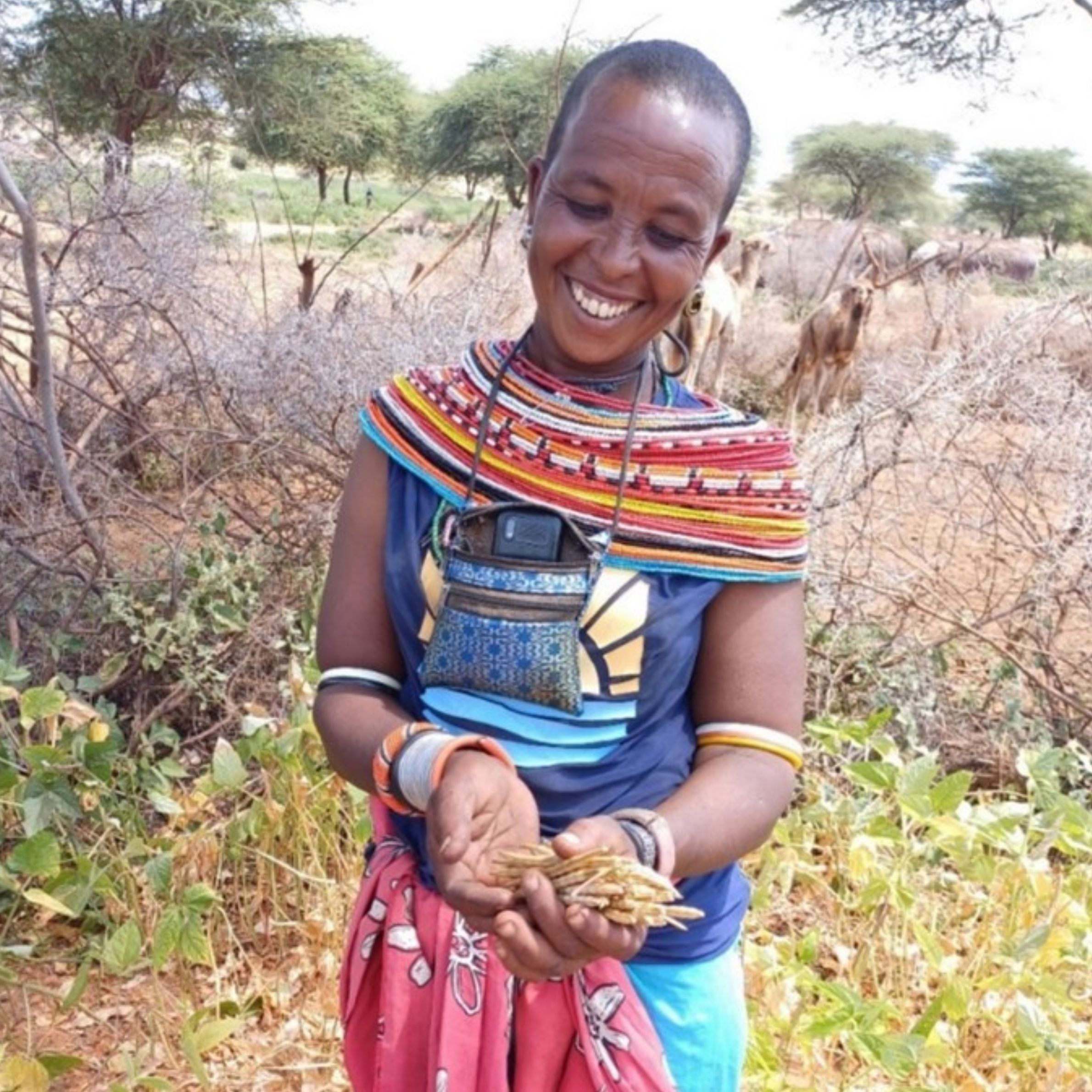
Ntaato Lepurote
Harvests of Hope
In the dry and parched lands of Laisamis in Marsabit County, Kenya, life appeared to depict sorrow and hopelessness. People were living one day at a time, reeling from drought and flash floods, confronting cattle rustling and banditry, facing poverty and early marriages, and struggling with illiteracy and political exclusion. For many years, residents of Korr/Ngurunit in Laisamis hung on thin lines of hope for a better tomorrow.
“We had despaired and lost hope when drought wiped out our livestock. Men and boys migrated and stayed for many months, with reports of livestock deaths. Amidst the fear of cattle rustling, we constantly lived in fear of losing our men,” said program participant Ntaato Lepurote. “Our boys left school to accompany men in search of pasture and water. Indeed all hope was lost.”
Shortly after, however, the community was reminded that hope is never truly lost. “God remembered us when CWS came with food from Canada and for a whole year, we ate good food, a lot of food. Our hope was revived. When we thought it was over, they came to look for us again, to teach us how to produce the food,” she said with excitement.
Ntaato is a member of the Naliapo Self-Help Group and is among the 330 participants of the early recovery program supported by Church World Service. Through training and input development, she was able to establish a vegetable garden as well as set up a small plot for the production of green grams and cowpeas. “I had never imagined in my life that I could grow food by myself!” she exclaimed, adding, “I don’t have to wait for relief food anymore.”
The harvest of green grams and cow peas from the small farms is a harvest of hope for many people in the Ngurunit location. The community never imagined that the solution to their greatest problem was right below their feet.
This harvest of hope highlights the importance of investing in people and their potential to drive sustainable change. Through continued collaboration and dedication, we can pave the way for a brighter future for all, where communities thrive and individuals can realize their full potential.
We would like to thank our partners, Canadian Foodgrains Bank and the Primate’s World Relief and Development Fund, as well as Global Affairs Canada for allowing this assistance to be possible. To learn more about this emergency response, click here. You can learn about our programs in Africa here.
A True Leader
October 10, 2024
“I remember that day, as if it was a dream… like a drama…” Margaret Kitheka states, as we begin a conversation about her unexpected ascension to the leadership position of her self-help group, where she now sits as the group secretary. The following text is Margaret’s retelling of her experience becoming a leader in this program: With the CWS project …
Stories of Change

Felistus Nguyo and her chickens
Clucking to Success: Mama Nguyo’s Inspirational Journey
Kitui lies in the rolling hills of eastern Kenya, about three hours west of Nairobi. Highways lead to dirt roads, which lead to communities of people living in remote, difficult terrain. In the rainy season, the landscape comes alive with green grasses and flowing streams, but it is often dry with patches of red dirt and sparse vegetation. Growing crops can be difficult, and natural disasters often bring worries of hunger and thirst.
It was here, just outside her home, that Felistus Nguyo stood waiting to greet us in a bright, beautiful dress and a warm smile.
Felistus is known in her community as Mama Nguyo. Widowed and the mother of seven children, she has seen hardships and joys throughout her life. When locusts swarmed her community and destroyed much of their crops, Mama Nguyo became increasingly worried about how to feed herself and her family.
Through the support of CWS, Mama Nguyo received the building blocks she needed: three chickens. Because of the care she provided to her small flock, Mama Nguyo now has 20 chickens and was able to buy a rooster of her own.
Mama Nguyo proudly showed us her chickens while telling us about the impact they have had on her life. She calls them her “business and her livelihood.” Her garden, which feeds both her family and her flock, is thriving because she can use the chicken waste as fertilizer. She has made enough money from selling eggs and chickens at the market that she was able to not only provide food for her family but also buy new and comfortable chairs for her home.
The chickens that changed Mama Nguyo’s life clucked in the background as she told us, “I am happy and doing so well” now. It was apparent that the support she received from CWS didn’t just help her survive the locusts’ swarm—it gave her the tools she needed to build a more stable future for herself and her family.
You can support programs like this one by joining your local CROP Hunger Walk. You can learn more about our work in Africa here.
Stories of Change
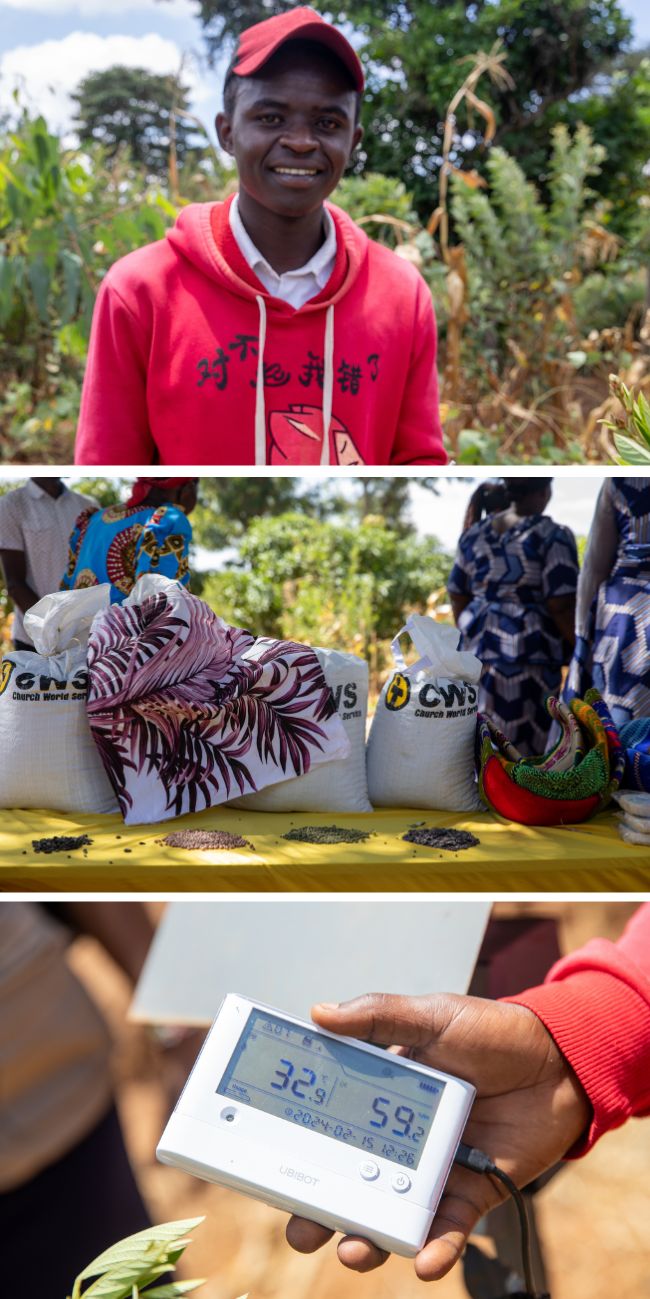
Top: Michael Mwendwo, Middle: beans grown by farmers in Kitui, Bottom: IoT device
IoTs Support Farmers in Nairobi
The people of Kitui County, Kenya, which is east of Nairobi, had three seasons of failed harvest. The communities in this county were feeling the effects of climate change, and life was extremely hard without successful harvests. CWS started working with these communities in 2021 to improve their resilience by increasing the utilization of technology in climate change information.
Earlier this year, the communities were filled with hope after finally having a successful harvest. Farmers grew a bounty of coriander, greens and beans and shared how they have a varied diet. This dietary diversity has led to noticeable enhancements in their children’s health. They cultivated mung beans, a type of legume, as a source of protein and cowpeas, also known as black-eyed peas, for energy. Additionally, they grew sunflowers and sorghum, primarily to feed their chickens.
What led to this successful harvest after so many failed seasons? A significant factor was a compact IoT device that relayed crucial data to the farmers. IoT, which stands for “Internet of Things,” are devices with sensors that can process data, connect to other devices and exchange that information over the internet.
CWS piloted this project with 160 farmers, installing six IoT devices in gardens over six kilometers with the goal of understanding climate information. Nancy Mwakha, CWS Africa’s Project Officer for the Climate Change Adaptation and Resilience Program, noted that this pilot project “helps farmers prepare and plan farming.” The devices can transmit climate changes to soil, tell weather conditions in area, including if it has rained, communicate soil pH levels and gather air temperature and humidity. CWS collects this data, interprets it and then disseminates it back to the farmers.
25-year-old Michael Mwendwo, who is part of a CWS-supported youth entrepreneurship program, monitors and ensures the safety of each IoT device. The boxes provide information that is for a much smaller area, providing significantly more accurate data to the exact location of a farmer’s garden. Based on the data the farmers receive, they can adjust the crops they plant or make modifications to the soil, like changing the fertilizer.
Through just a bit of support, these farmers can overcome any new challenges to their harvests and ensure that their community is fed.
You can learn more about CWS’ work in Kenya by clicking here
Stories of Change
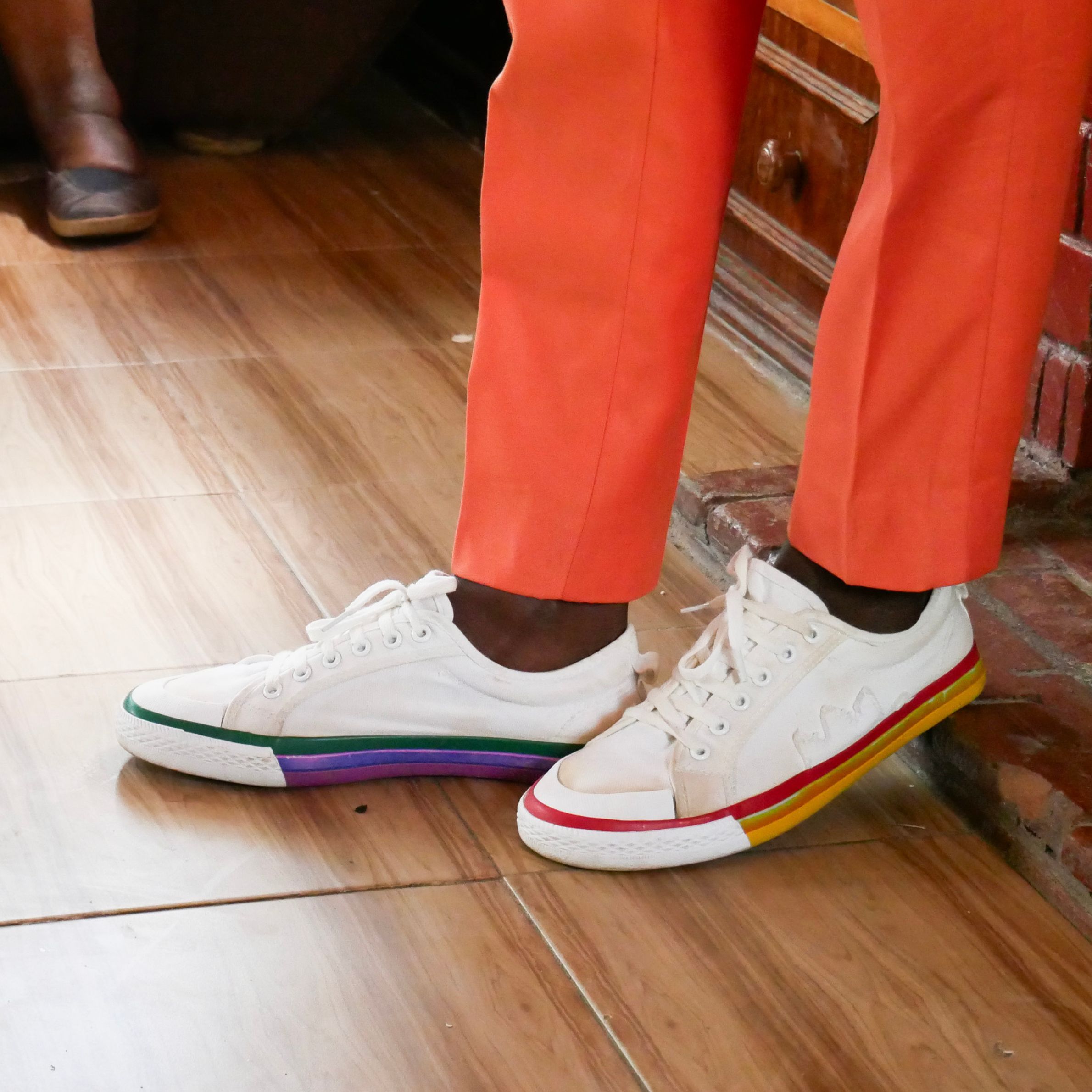
Safe Space Program Participant, Isaiah
The Radical Welcome of Safe Space
“You are safe here.” With these simple yet profound words, we stepped into the welcoming embrace of an LGBTQ+-affirming community house for refugees, supported by CWS’s Safe Space* program. This declaration, voiced by Isaiah*, a program participant and leader, encapsulates the essence of what Safe Space strives to create: a haven of belonging, comfort and acceptance.
For many, this feeling of security is found in our homes, places of worship or other “third space” spots like local gyms and coffee shops. These sanctuaries allow us to be ourselves, free from fear or judgment. Yet, for countless LGBTQ+ individuals across the globe, such safe spaces are a rare and precious luxury. Instead, members of this community must navigate a world that compels them to shrink their personalities so that one slip-up doesn’t cost them their safety or, in some cases, their lives.
In the community house we visited, Isaiah’s presence seemed to match or perhaps create the energy in which we sat. He wore bright orange pants, a white top and Converse sneakers that subtly but bravely revealed rainbow outlines. In one word, Isaiah was radiant. He spoke with confidence and you could see the way the other program participants admired and felt safe with him. As we each introduced ourselves, the participants let us know that in this home, they are all brothers and sisters; a sentiment that not only perpetuated kindness and welcome but courageously challenged what a family structure means.
As we sat in a circle in this space that was flooded with light and warmth, the participants shared pieces of their stories. Many revealed the harassment they face each day on the streets and the concern about whether they will even make it home that night. Some told stories of heartbreak when their families rejected them, disowned them and left them with nothing.
One individual shared that every night, he and his fellow program participants hold a church service in the privacy and safety of the community house. Despite the rejection some of them had faced from religious figures, they held onto their faith, choosing to believe in its goodness. He wondered if any churches existed that welcomed queer individuals and was excited when our local colleague shared that Safe Space partners with faith leaders to create LGBTQ+-affirming churches. Even more surprising to him was the news that CWS is a faith-based organization. His excitement was matched by our own realization of how unique and radical this program truly is. In a world where many queer individuals struggle to find acceptance in religious spaces, here was CWS, a faith-based organization saying, “we accept you, we care about you and we support you.”
Through each word, and each story that Isaiah and the participants voiced, there existed a deep intentionality. It became intensely noticeable what this space truly meant for each participant. What it meant to be called “brother” or “sister”; to be seen the way you see yourself and to laugh and speak without wondering if you have shown too much. In this space, individuals could peel off the armor that they were forced to carry, and in their greatest vulnerability, they could be seen and loved.
*CWS’ Safe Space program works to develop spaces for LGBTQ+ refugees and locals where they can find belonging and access additional care including shelter, psychosocial support, legal resources and healthcare. The program aims to develop public attitudes that are affirming and inclusive of LGBTQ+ communities by partnering with and educating faith leaders. You can click here to learn more about our work in CWS Africa.
Note: For the safety and protection of the program participant in this story, faces have been hidden and a pseudonym has been used.
—
This story was written by Mariana Gama, CWS Program Communications Specialist
Stories of Change
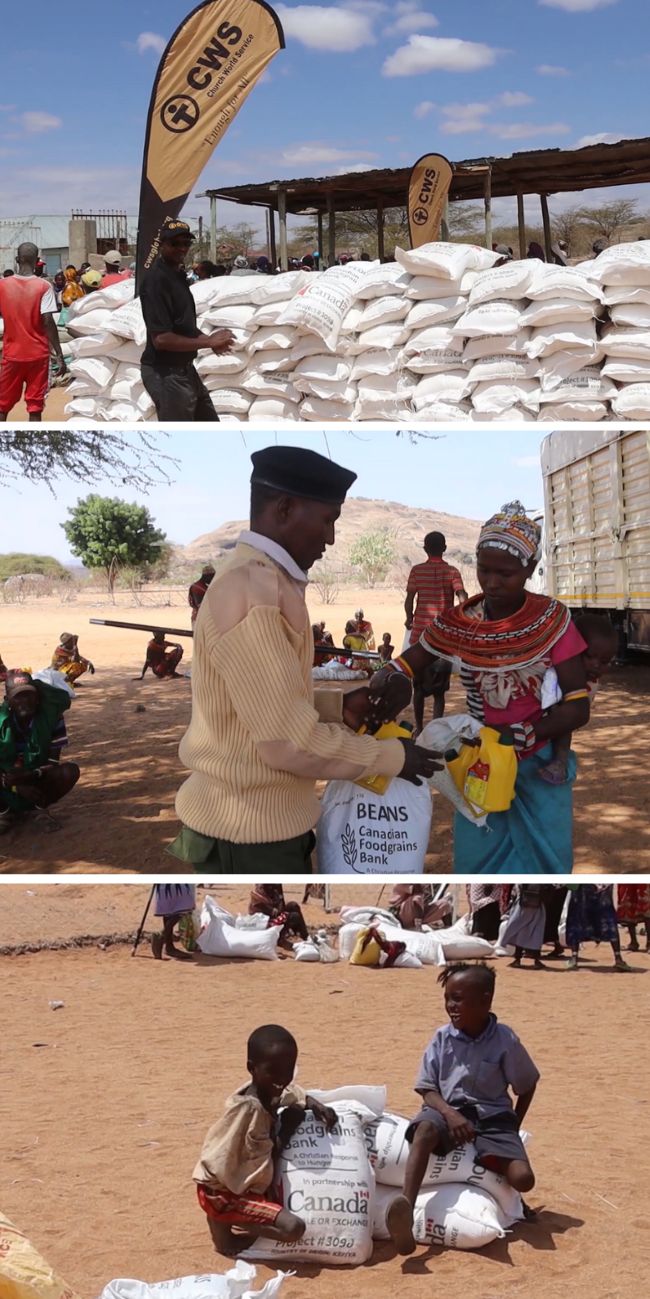
Top: Michael Kendagor stands next to rations, Middle: Local officer gives rations to resident, Bottom: Children laugh next to food rations
8,000 Lives Changed
In countries around the world, we are seeing the close connection between climate change and hunger. The ability to grow food is largely dependent on the environment. If the environment lacks stability, so does our ability to put food on the table. This tight-knit, cause-and-effect type of situation describes the current state of many communities in Kenya.
With our generous partner, the Canadian Foodgrains Bank, we have been monitoring the historic drought in Kenya and providing food assistance to those most affected. You may recall our recent project in Tana River County. Thanks to our partner, we are moving north and providing similar assistance to communities in the town of Lasiabis in Marsabit County.
In Laisamis, all are feeling the effect of hunger on their day-to-day lives. Local officer, Charles Mbole, shared, “several students have dropped out of school in this region due to starvation. Some have moved with their animals in search of pastures and others are too weak to walk to school.” Julieta Sumper, a local resident and program participant added, “our children were malnourished. Some were only surviving on nuts.”
The assistance provided has been the much-needed relief many families needed to regain their strength. Michael Kendagor, CWS’ Emergency Coordinator explained, “we are here to reach out to about 4,000 households, which is about 26% of the entire population of Laisamis sub-county. For each household, we are giving about 50 kilos of maize, 7 kilos of beans, 3 liters of cooking oil and half a kilo of salt.” (That’s about 110 pounds of corn, 7 pounds of beans, almost 1 gallon of oil and a little over a pound of salt!)
In response to the assistance, Julieta said, “we are thankful for the food assistance from CWS.” Our current goal is to reach about 8,000 people within the sub-counties by the end of the project. These 8,000 individuals represent a child who can go to school again, a parent who no longer has to worry about their children going hungry and a neighbor who can choose to stay in the place they call home.
We would like to thank our partners, Canadian Foodgrains Bank and the Primate’s World Relief and Development Fund, as well as Global Affairs Canada for allowing this assistance to be possible.
Stories of Change
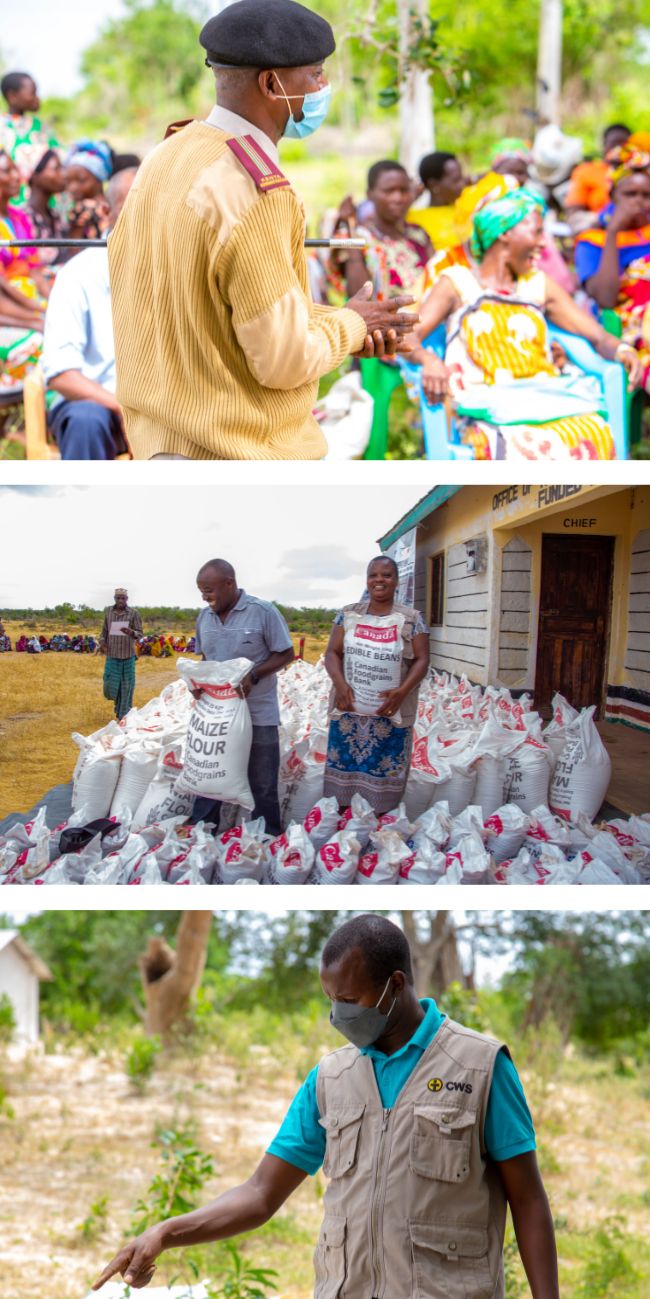
Top: local official assists in food distribution. Middle: CWS Staff distribute food. Bottom: CWS staff leads food distribution
A Closer Look into Our Tana River Drought Response
In Tana River County, Kenya, when drought spread and crops and livestock died, immediate action was needed. We partnered with Canadian Foodgrains Bank and Primate’s World Relief and Development Fund to provide emergency food rations to 3,000 families (15,000 individuals). To understand the severity of the droughts and the impact of our program, we spoke with the members of the community.
The effects of the drought were clearly visible in the Tana River County community where livestock perished and crops dried out. Khadija Haula, one of our program participants, explained, “we experienced severe drought and if it were not for Church World Service and their humanitarian aid, we perhaps would be dead. We are suffering a lot as a result of the drought.” Zainab Wamboi is from one of the fortunate families who received emergency food rations just in time. She told us, “during the drought, we never felt [hunger]. We heard people talk about it but we had enough to eat.”
Beyond hunger, the effects of the drought carried into the normal day-to-day activities of the community. Dhidha Komora works as a Chief in Tana River County. He shared, “I have noticed some major changes. [Prior to assistance] many young people were stuck at home due to a lack of food. When families started receiving this food aid, they were able to go back to school. Now the youth are in school and thanks to CWS my people received plenty of food.”
Along with our CWS staff in Kenya, this project was led in large by the leaders in the community. Amina Omar, Project Officer at CWS Kenya, elaborated. “The program participant selection was done by the community leadership. They lead the process to ensure that all participants were part of a vulnerable group in the community,” she said.
Another step that was taken was the creation of a community-led advisory committee. Members of the committee were trained on humanitarian principles and led the food distribution. One of the members, Kushusho Galgalo, shared, “part of what was taught during the training was to consider those most in need.” Another committee member, Halima Omar, said, “I was one of the committee members who participated in the food distribution for four months. We want to thank this organization for this great work.”
We are thankful for our community and global partners who allow us to support communities during the times in which they need it most.
- Page 1 of 2
- 1
- 2
